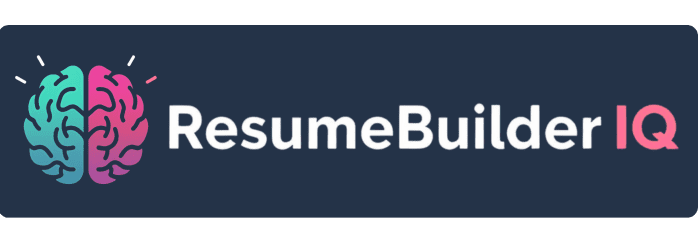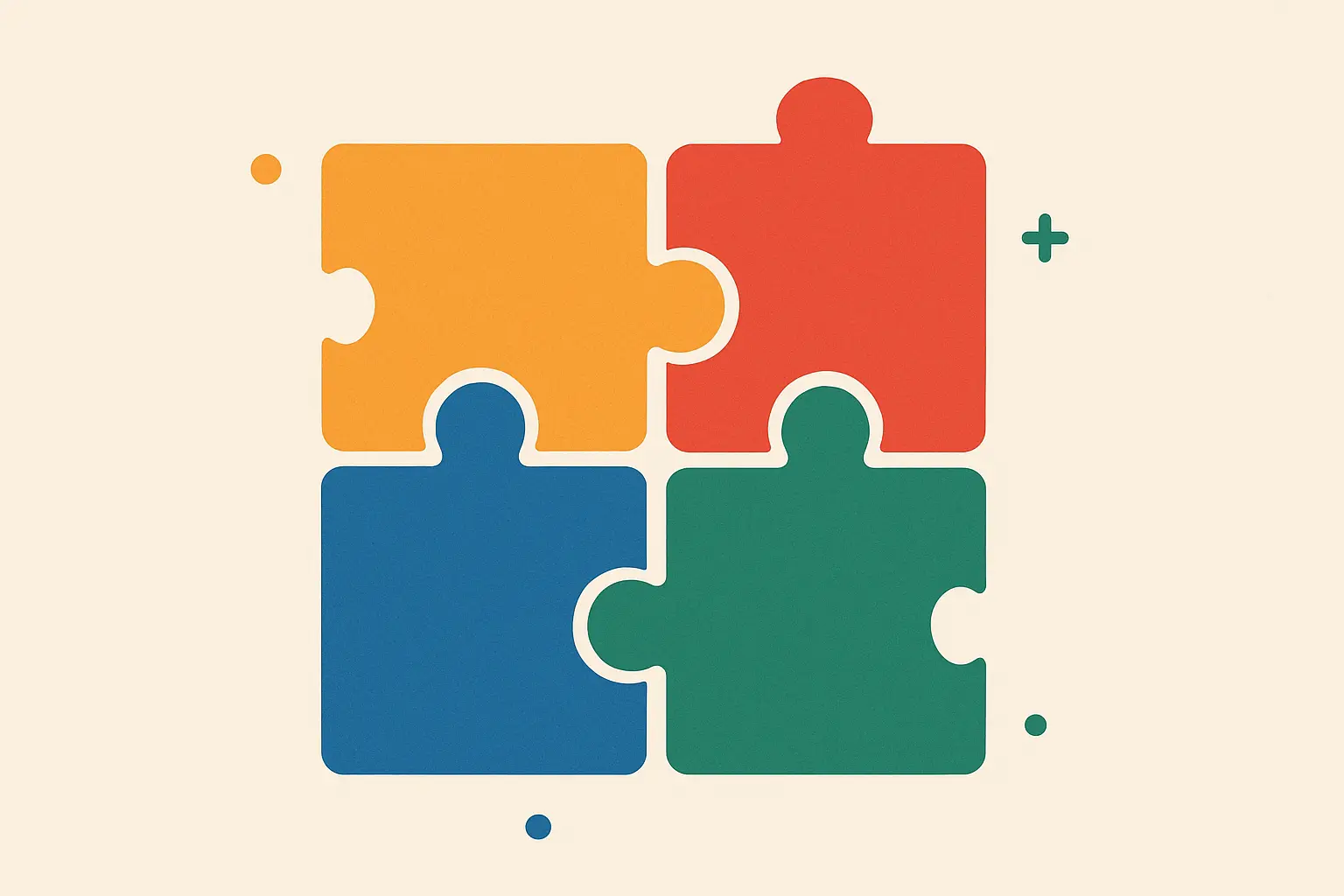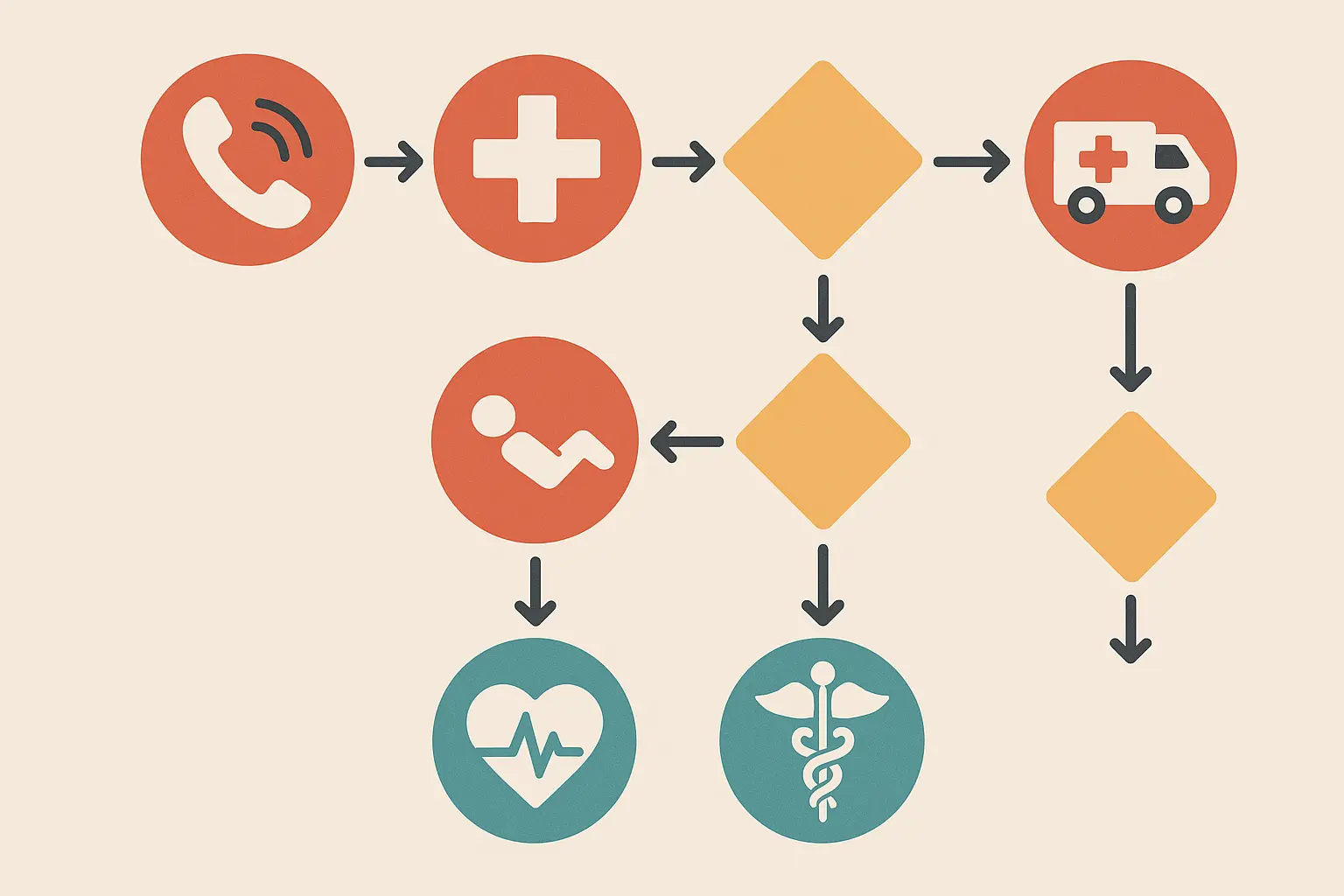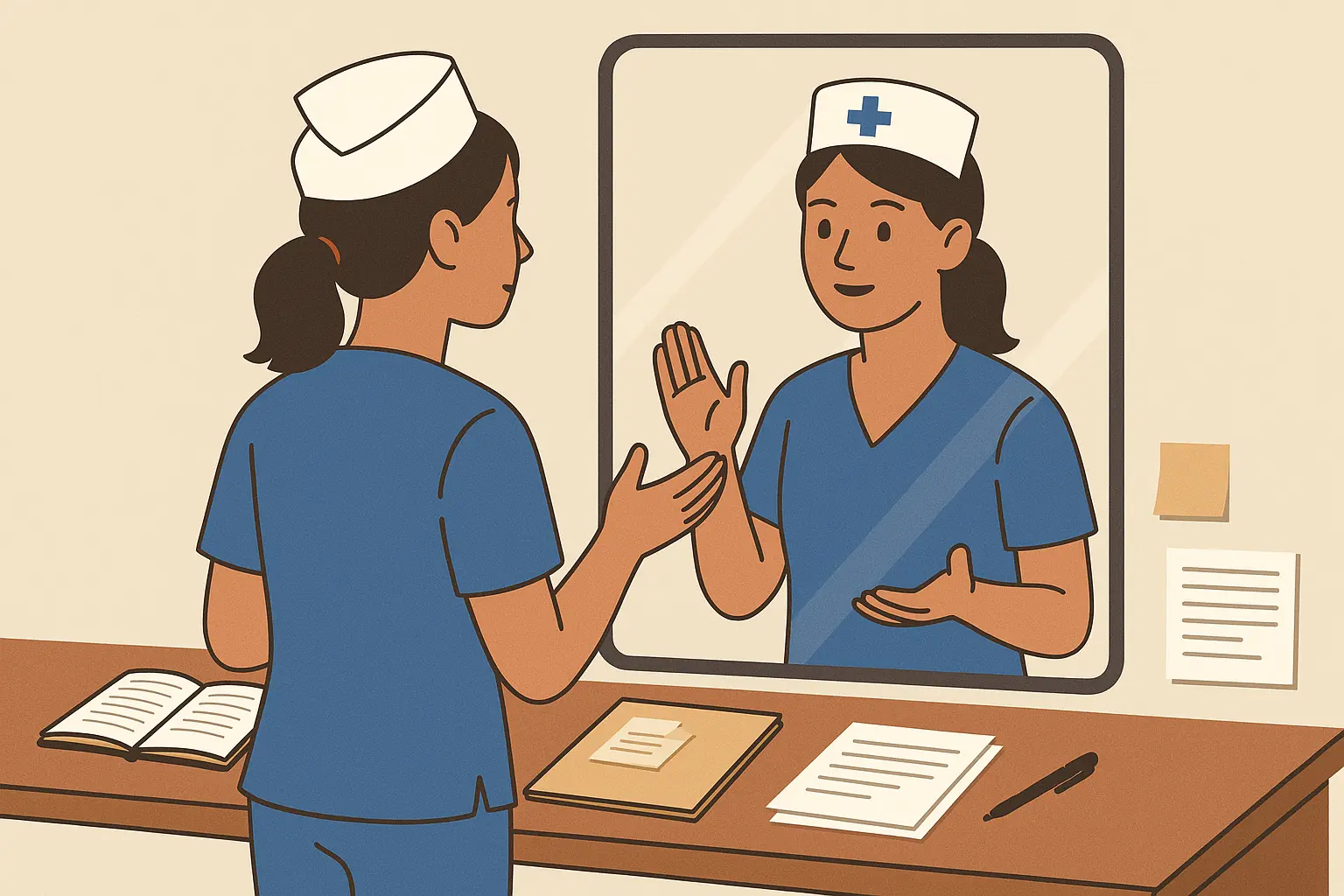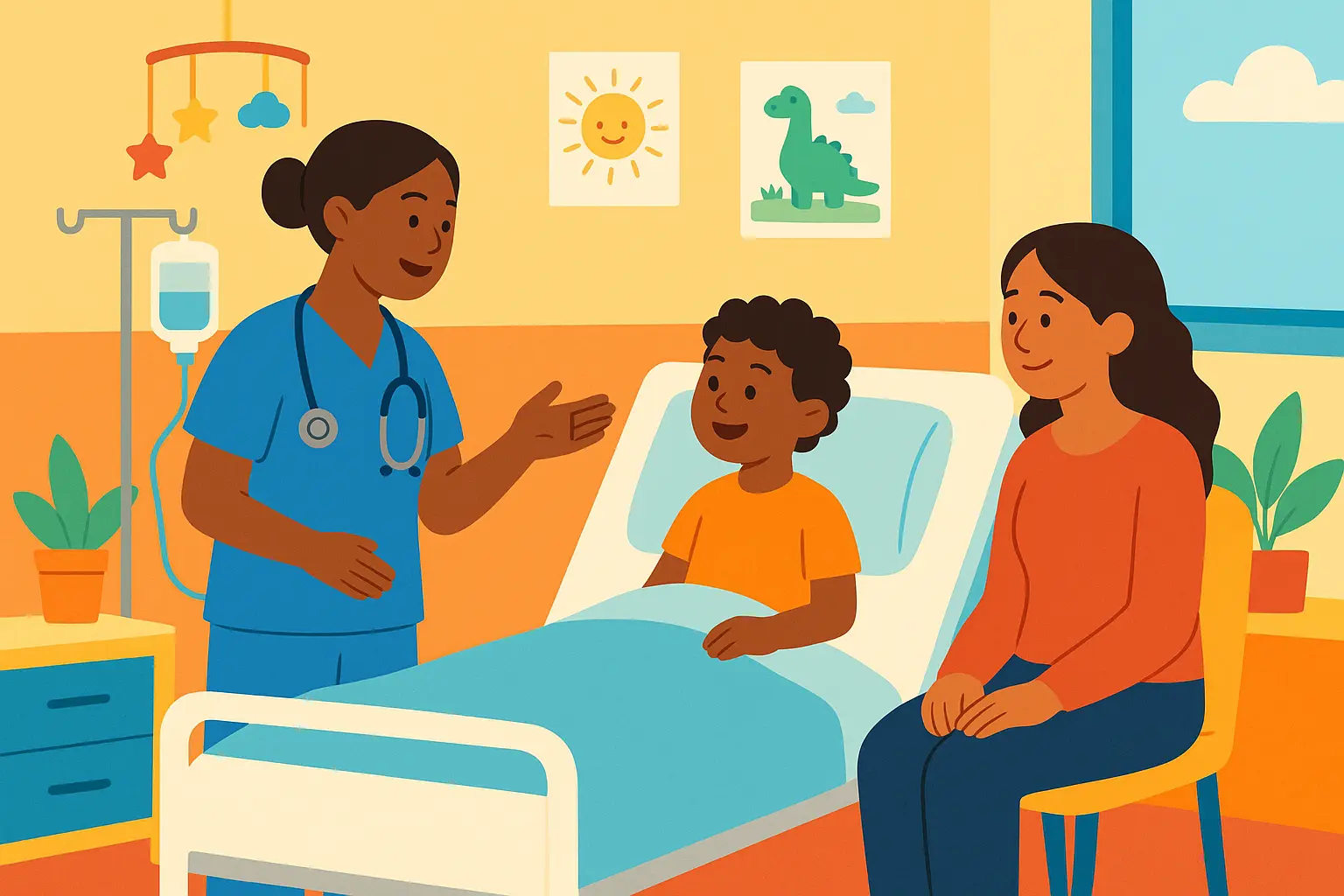Nursing Interview Questions That Actually Matter (And How to Nail Every Single One)

Let’s be honest – nursing interviews aren’t what they used to be. I’ve sat through enough of them to know the game has completely changed. With nursing job growth projected to increase by 6% through 2028 according to the Bureau of Labor Statistics, the competition for quality positions has intensified. I’m going to walk you through everything from behavioral questions to clinical scenarios, helping you transform interview anxiety into interview success.
By preparing for the most common nursing interview questions, you’ll walk into the room with confidence instead of nerves.

Table of Contents
- What Modern Nursing Interviews Really Look Like
- Interview Formats You’ll Face
- The STAR Method: Your Interview Lifeline
- Clinical Nursing Interview Questions That Count
- Ethical Scenarios: No Perfect Answers
- Smart Questions to Ask Them
- New Grad vs. Experienced Strategies
- Practice That Actually Works
- Specialty-Specific Prep
- When Things Go Wrong
- Putting It All Together
What Modern Nursing Interviews Really Look Like
Healthcare hiring has evolved beyond basic clinical knowledge checks. Today’s interviews are designed to predict how you’ll perform in real-world healthcare situations. The days of simply reciting textbook answers are over. Interviewers want to see how you think through complex situations, handle pressure, and work within healthcare teams.
I remember when interviews focused primarily on technical knowledge. Now, they’re looking for nurses who can think critically under pressure and communicate effectively with diverse patient populations. This shift makes sense when you consider the complexity of modern healthcare delivery.
Understanding how to structure your responses effectively parallels the importance of creating ATS-friendly resume formats that showcase your qualifications in ways hiring managers can easily identify and appreciate.
Why Everything Changed
The shift toward behavioral-based interviews reflects healthcare facilities’ need to identify nurses who can handle complex patient situations, work effectively in teams, and adapt to rapidly changing medical environments. Hospitals now prioritize candidates who demonstrate both clinical competency and emotional intelligence.
Technology’s Impact
Virtual interviews and AI-assisted screening tools have become standard practice. You need to maintain eye contact with cameras and manage technical difficulties while presenting your best professional self. These changes mean your preparation strategy needs to include technology considerations alongside traditional interview skills.
Question Categories That Define Modern Interviews
Most nursing interview questions fall into predictable patterns once you understand what interviewers are really trying to assess. They want to see your clinical reasoning, your ability to work under pressure, and how you handle ethical dilemmas.
Contemporary interviews span multiple assessment areas, from clinical competency and situational judgment to leadership potential and patient safety awareness. Understanding these categories helps you prepare targeted responses that demonstrate your capabilities across all areas employers value.
Interview Formats You’ll Face
Different healthcare settings employ various interview styles, each requiring specific preparation strategies. I’ve experienced everything from intimate one-on-one conversations to intimidating panel interviews with five people firing questions at me.
| Interview Format | Key Characteristics | Preparation Strategy |
|---|---|---|
| Panel Interview | 3-5 interviewers, diverse perspectives | Practice eye contact distribution, prepare for varied question styles |
| One-on-One | Single interviewer, deeper conversation | Focus on building rapport, carry conversational load |
| Virtual/Zoom | Technology-dependent, limited body language | Test tech beforehand, optimize lighting and background |
| Hands-On Assessment | Practical demonstrations, skill validation | Review clinical procedures, practice explaining your process |
Panel vs. Individual Interview Dynamics
Panel interviews present unique challenges in managing multiple personalities and question styles while ensuring you connect with each interviewer. During panel interviews, I’ve learned to address my answer to the person who asked the question while making eye contact with other panel members throughout my response.
Individual interviews allow for deeper conversation but require you to carry more of the conversational load. The key is building rapport while demonstrating your professional capabilities.
Hands-On Assessment Components
Many facilities now include practical demonstrations to assess clinical competency beyond verbal responses. These assessments might involve medication calculations, documentation reviews, or simulation-based scenarios that test both technical skills and critical thinking.
I actually enjoy these practical components because they allow you to show your skills in action rather than just talking about them. The key is narrating your thought process as you work through the scenario.
The STAR Method: Your Interview Lifeline
One of the most effective ways to handle behavioral nursing interview questions is by using the STAR method, which ensures your answers stay clear and structured.” Here’s how I handled the “tell me about a difficult patient” question that trips up most candidates:
I had this elderly gentleman who refused his cardiac meds for three straight days (Situation). My job was getting him compliant without being pushy (Task). So I sat down, asked about his concerns, and discovered he was terrified of becoming “dependent” on pills like his late wife (Action). Once I explained how these specific meds worked and involved his daughter in the conversation, he started taking them consistently (Result).
This framework keeps you focused and ensures you don’t ramble or forget important details. The structure forces you to provide concrete examples rather than theoretical responses.
Another STAR Example:
Situation: “While working on a medical-surgical unit, I cared for an elderly patient who had been admitted with pneumonia. During my assessment, I noticed subtle changes in his neurological status—mild confusion and lethargy that weren’t documented in previous shifts.”
Task: “I needed to determine if these changes were significant and advocate for appropriate medical intervention despite initial dismissal from other staff members.”
Action: “I documented my findings with specific, objective details, performed a thorough neurological assessment, and contacted the physician directly using SBAR communication to clearly explain my observations and concerns.”
Result: “The physician ordered a CT scan, which revealed a small subdural hematoma. The patient received appropriate treatment much earlier than he would have if we’d waited for more obvious symptoms, potentially preventing significant complications.”
Choosing the Right Stories for Maximum Impact
I keep a mental catalog of about six or seven key experiences that showcase different aspects of my nursing practice. This preparation allows me to quickly select the most relevant example for whatever question comes my way.
The most effective stories demonstrate critical thinking, leadership, or exceptional patient care while showing measurable outcomes. Focus on situations where your actions made a significant difference in patient outcomes, team performance, or process improvements.
Quantifying Results That Matter
You can discuss patient improvements, satisfaction scores, or safety measures by focusing on general outcomes rather than specific patient details. Instead of saying “the patient got better,” explain how their vital signs stabilized or their pain scores decreased.
Clinical Nursing Interview Questions That Count
Many clinical nursing interview questions involve messy, real-world scenarios where multiple things go wrong at once. Like when you’ve got five patients, one call light going off every two minutes, and suddenly someone’s blood pressure tanks. Walk them through your thinking out loud. They want to see how your brain works under pressure.
These questions often catch candidates off guard because they require you to think on your feet and demonstrate clinical reasoning in real-time. The best approach is to think out loud, showing your systematic decision-making process.
Medication Administration Scenarios
These questions assess your knowledge of the five rights of medication administration while testing your ability to handle complex situations involving drug interactions, patient refusals, or dosage calculations under pressure.
Complex Medication Scenario Response:
“When I encounter potential medication errors, I follow a step-by-step approach. For instance, when I noticed an unusually high dosage of Digoxin ordered for an elderly patient, I first double-checked the order against the MAR, then consulted with the pharmacist before contacting the physician. The physician confirmed it was indeed an error, and this catch prevented what could have been a serious adverse event. I always adhere to the five rights plus the additional rights of documentation, reason, and response.”
Patient Safety Protocol Applications
Questions about safety protocols evaluate your understanding of infection control, fall prevention, and emergency procedures while assessing your ability to implement these measures in real-world situations.
These questions often involve prioritization scenarios where multiple patients need attention simultaneously. The key is demonstrating your ability to triage effectively while maintaining safety standards.
Emergency Response Decision-Making
Picture this scenario: You’re working nights with minimal staff when a patient goes into respiratory distress while another patient is experiencing chest pain. How do you prioritize?
These scenarios test your ability to prioritize actions during medical emergencies, coordinate with team members, and maintain patient safety while managing multiple competing demands.
Ethical Scenarios: No Perfect Answers
Ethical scenarios evaluate your moral reasoning and decision-making when facing conflicts between patient wishes, family demands, or institutional policies. I find these questions particularly challenging because there often isn’t a clear-cut right answer. The interviewer wants to see your thought process and how you balance competing ethical principles.
Confidentiality and Privacy Challenges
These scenarios involve balancing transparency with patient privacy requirements, handling family requests for information, or managing situations where confidentiality conflicts with patient safety concerns.
Questions about family interactions test your ability to maintain patient confidentiality while providing appropriate support and information to concerned relatives. Your responses should demonstrate understanding of HIPAA requirements and therapeutic communication techniques.
Resource Allocation Decisions
These scenarios present situations where patient needs exceed available resources or staff capacity, requiring you to make difficult decisions about care prioritization while maintaining ethical standards.
Healthcare facilities want to know that you can make tough decisions while maintaining your ethical compass. I always emphasize patient safety as my primary concern while acknowledging the complexity of these situations.
Questions about managing care during staffing shortages evaluate your ability to prioritize patient safety, delegate appropriately, and maintain quality care standards despite resource limitations.
Smart Questions to Ask Them
Don’t ask generic questions like “What’s the culture like?” Instead, try: “What does a really bad day look like on this unit?” or “Tell me about the last nurse who thrived here – what made them successful?” These questions show you’re thinking beyond the honeymoon phase.
Just as you prepare thoughtful questions for your interviewer, crafting compelling cover letters requires similar strategic thinking about what information will resonate most with hiring managers and set you apart from other candidates.
| Question Category | Sample Questions | What It Reveals |
|---|---|---|
| Training & Support | “How long is the orientation period and what does it entail?” | Commitment to new hire success |
| Unit Culture | “Can you describe the nursing culture and team dynamics?” | Work environment and collaboration |
| Professional Growth | “What professional development opportunities are available?” | Investment in employee advancement |
| Performance Expectations | “How is success measured for new hires?” | Clear expectations and feedback processes |
Organizational Culture Insights
Questions about workplace environment and values alignment help you understand team dynamics, communication styles, and institutional priorities while showing interviewers that you’re thinking beyond just getting hired.
Try asking: “How does the nursing staff support each other during particularly challenging situations?” This gives you insights into team cohesion while demonstrating your commitment to teamwork.
Professional Development Opportunities
Questions about continuing education, certification support, and career advancement paths show your commitment to professional growth while helping you evaluate the organization’s investment in employee development.
Ask about promotion opportunities, leadership development programs, and specialty training options to demonstrate ambition while gathering information about your potential future with the organization.
New Grad vs. Experienced Strategies
The questions you’ll face vary significantly depending on your experience level. New grads shouldn’t try to fake experience they don’t have, while seasoned nurses need to explain why they’re making a change.
New Graduate Success Strategies
New nurses should leverage clinical rotations, volunteer experiences, and transferable skills to demonstrate competency despite limited professional experience. Focus on learning agility, adaptability, and enthusiasm for professional growth.
New graduates can strengthen their candidacy by understanding how to effectively highlight soft skills on their resume and translate those competencies into compelling interview responses that demonstrate their potential value to healthcare teams.
New Graduate Clinical Rotation Example:
Picture this: 3 AM, pediatric ward, and I’ve got a six-month-old who won’t stop crying. The parents couldn’t be there, and I could see this baby needed more than just medical care. I spent extra time providing comfort measures and called the mother during feeding time so she could hear her baby. This experience taught me the importance of family-centered care and how small gestures can significantly impact the healing process and family satisfaction.
Experienced Nurse Transition Tactics
Seasoned nurses changing specialties or advancing to leadership roles must explain career progression rationale while demonstrating how existing skills transfer to new environments and showing readiness for increased responsibilities.
When I transitioned from med-surg to ICU, I had to clearly explain how my foundational skills would translate while acknowledging the learning curve ahead. Honesty about what you need to learn shows self-awareness and commitment to growth.
Articulating how your current skills apply to new nursing environments requires identifying transferable competencies, demonstrating adaptability, and showing enthusiasm for learning new protocols and procedures.
Practice That Actually Works
Practice until responses feel natural, but avoid sounding robotic. I recommend recording yourself answering questions to catch verbal tics or nervous habits you might not notice otherwise
Mock Interview Implementation
Structured practice sessions that simulate real interview conditions help you refine your responses, improve your body language, and build confidence in handling unexpected questions or challenging scenarios.
The first time I watched myself on video, I was shocked at how many times I said “um” and fidgeted with my hands. These recordings became invaluable tools for improvement.
Video practice allows you to analyze your body language, tone, and response quality objectively, identifying areas for improvement that you might not notice during live practice sessions.
Question Bank Development Strategy
Create a collection of potential interview questions organized by category and difficulty level. This ensures thorough preparation while helping you develop versatile responses that can be adapted to various scenarios.
Research common challenges, patient populations, and care protocols relevant to your target position while preparing specialized responses based on specific healthcare settings.
Specialty-Specific Prep
Different nursing specialties require tailored interview approaches, with ICU positions focusing on critical thinking under pressure, pediatric roles emphasizing family communication, and management positions evaluating leadership capabilities.
Recent developments in CRNA education highlight the importance of “specialized interview preparation for advanced practice roles” nurse.org, as programs increasingly focus on candidates who can demonstrate both clinical expertise and leadership potential in high-stakes environments.
Questions become more specialized as you advance in your career or move into specific units. Emergency department interviews focus heavily on triage skills, while oncology positions emphasize compassionate communication during difficult conversations.
Critical Care and Emergency Nursing Focus
ICU and ER interviews emphasize rapid decision-making, crisis management, and ability to function in high-stress environments. Interviewers want to see evidence of your composure during emergencies and your approach to complex patient situations.
These questions present life-threatening situations requiring immediate action, testing your ability to prioritize interventions, communicate with team members, and maintain patient safety during chaotic moments.
Pediatric and Family-Centered Care
Pediatric nursing interviews focus on your ability to communicate with children at different developmental stages, work with anxious parents, and provide age-appropriate care while maintaining therapeutic relationships with entire families.
Questions in pediatrics often involve scenarios with scared children or upset parents. Your responses need to show patience, creativity, and excellent communication skills.
Questions about pediatric communication test your understanding of child development and your ability to explain procedures, provide comfort, and gain cooperation from young patients while supporting worried families.
When Things Go Wrong
You will blank out. It happens to everyone. I once completely forgot how to calculate a pediatric dosage in an interview – my mind just went completely empty. Instead of panicking, I said, “You know what, I’d want to double-check that calculation with a colleague and the pharmacy before administering.” They appreciated the honesty and focus on safety.
Healthcare recruiters are increasingly adopting “behavioral interviewing techniques developed by industrial psychologists in the 1970s” Nurse.com, emphasizing that the most accurate predictor of future performance is past performance in similar situations.
Even well-prepared candidates encounter challenging interview situations including unexpected questions, technical difficulties, or moments when you don’t know an answer.
Managing Unknown Territory
When faced with questions outside your experience or knowledge base, honesty combined with problem-solving approach impresses interviewers more than attempting to fake expertise you don’t possess.
Admitting knowledge gaps while demonstrating how you’d find answers or seek guidance shows intellectual honesty and commitment to patient safety, qualities that interviewers value highly in nursing candidates.
Technical Difficulty Navigation
Virtual interview technical problems require calm problem-solving and clear communication with interviewers. Having backup plans and maintaining professionalism during technical difficulties can actually strengthen your candidacy.
Preparing for technology failures involves having backup internet connections, alternative devices, and clear communication protocols with interviewers to minimize disruption and maintain interview momentum.
Similar to how you prepare backup plans for technical difficulties, understanding the balance between hard and soft skills on your resume ensures you’re prepared to discuss both technical competencies and interpersonal abilities during interviews.
Interview Preparation Checklist:
- Test technology 24 hours before virtual interviews
- Prepare backup internet connection (mobile hotspot)
- Have interviewer contact information readily available
- Practice with video conferencing platform beforehand
- Ensure quiet, professional environment
- Prepare printed copies of resume and references
- Review job description and organization mission
- Prepare 3-5 STAR method examples
- Develop thoughtful questions for interviewers
- Plan professional attire and grooming
Advanced Answer Refinement Techniques
Beyond basic STAR method application, sophisticated interview preparation involves timing optimization, authenticity maintenance, and cultural sensitivity integration. These advanced techniques help your responses stand out while remaining genuine and conversational.
Response Timing and Flow Management
Balancing thoroughness with conciseness requires practice and awareness of interviewer engagement cues. Effective responses provide sufficient detail without overwhelming listeners or losing their attention.
Watch for visual cues from your interviewers. If they start looking at their watches or shuffling papers, you might be going too long. Aim for responses that are complete but not exhausting.
Streamlining your responses involves identifying the most compelling elements of your stories while eliminating unnecessary details that don’t contribute to demonstrating your competencies.
Authenticity in Practiced Responses
Maintaining genuineness while delivering well-rehearsed answers requires finding the balance between preparation and spontaneity. Your responses should feel natural and conversational rather than scripted or robotic.
Weaving authentic personal experiences into your professional responses creates memorable connections with interviewers while demonstrating the values and motivations that drive your nursing practice.
Resume Builder IQ: Connecting Your Resume to Your Interview Success
Your nursing interview preparation connects directly to your resume and overall professional presentation. Resume Builder IQ’s AI-powered platform ensures your resume perfectly complements your interview readiness by incorporating the same competencies and achievements you’ll discuss during interviews. The platform’s ATS-friendly templates and healthcare-specific content suggestions help your resume include the right keywords and formatting to secure interview opportunities. When you’ve mastered these interview techniques, Resume Builder IQ’s integrated tools help you create a cohesive professional brand that increases your chances of landing your dream nursing position.
Interview preparation becomes more effective when your resume tells the same story you’ll share verbally. Consistency across all your professional materials reinforces your credibility and makes you more memorable to hiring managers.
Just as your interview responses should align with your professional brand, ensuring your resume follows professional formatting standards creates consistency across all touchpoints with potential employers and reinforces the competencies you’ll highlight during interviews.
Putting It All Together
Nursing interviews have evolved into thorough assessments that evaluate your clinical competency, critical thinking, and cultural fit within healthcare teams. Success requires understanding modern interview formats, mastering the STAR method for behavioral questions, and preparing thoughtful responses to clinical and ethical scenarios.
Your preparation strategy should include practice through mock interviews, developing a question bank, and creating compelling stories that demonstrate your nursing capabilities. Remember that interviews are conversations, not interrogations – your goal is to show how your skills and experience align with the organization’s needs while evaluating whether the position fits your career goals.
The investment you make in interview preparation pays dividends throughout your nursing career. These skills transfer to performance reviews, leadership opportunities, and future job searches, making thorough preparation a valuable professional development activity rather than just interview prep.
Interview questions will continue evolving as healthcare becomes more complex, but the fundamental principles remain constant: demonstrate your clinical competence, show your commitment to patient safety, and prove you can work effectively within healthcare teams. Master these elements, and you’ll succeed in any set of nursing interview questions that come your way.
